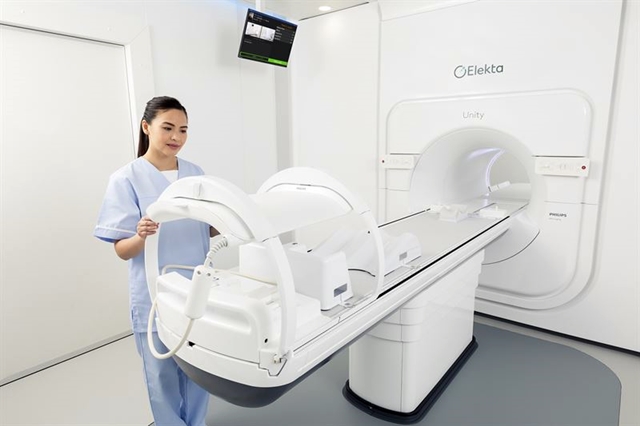4 Feb. 2019. A clinical trial is underway to evaluate radiation therapy guided by magnetic resonance imaging, to help encourage its adoption in clinical cancer practice. The study, known as Momentum, is being conducted by a consortium of medical centers in Europe and North America founded by Elekta Instrument AB in Stockholm, Sweden, the company developing the technology.
The technology known as magnetic resonance – linear accelerator, or MR-Linac, combines MR imaging with high energy X-rays sent from the linear accelerator. High-resolution MR imaging, says Elekta, makes it possible to better visualize the tumor regions treated in the patient, while Linac provides radiation doses that hit more precise targets, which helps reduce the occurrence of adverse side effects. The precise targeting enables higher doses of radiation, while sparing surrounding healthy tissue.
Elekta’s Unity system combining MR imaging and linac radiation was developed with medical technology company Royal Philips. The system already received regulatory clearances with a CE mark in Europe in June 2018, and from the U.S. Food and Drug Administration in December.
Elekta started the MR-Linac Consortium in 2012 with Philips to document best practices with the technology. The consortium initially was formed with 7 medical centers in the Netherlands, U.K., Canada, and the U.S. Participants today, says Elekta, include cancer specialists, radiation therapists, epidemiologists, and medical physicists worldwide. At the group’s most recent meeting in April 2018, the consortium discussed ways of standardizing procedures for imaging and radiating tumors to maximize cancer-killing effects, but also protect sensitive regions, such as around the heart.
The Momentum trial is designed to gather real world evidence on the use of magnetic resonance/radiation therapy or MR/RT for cancer, from which technology developers and practitioners can gain insights on refining and integrating the treatments into cancer care for patients. Rather than sampling from a universe of patients, the study team is asking all patients receiving therapy with the Unity system to share their experiences, with identifying information removed for privacy, including tumor control and subsequent quality of life. The consortium plans to collect the data in repositories to help evaluate clinical outcomes and alternative treatments, as well as plan further technical enhancements.
“Each treatment session on this innovative system is an opportunity to gain insight into the benefits that this technology provides and, critically, to determine which patients benefit from MR/RT therapy,” says Helena Verkooijen, an epidemiologist at University Medical Center Utrecht in the Netherlands, in an Elekta statement. Verkooijen is also part of the Momentum study’s management team.
William Hall, a professor of radiation oncology at the Medical College of Wisconsin in Milwaukee and MR-Linac participant adds, “We believe that this kind of rigorous and coordinated approach has tremendous potential to improve patient outcomes and change radiotherapy.”
More from Science & Enterprise:
- Brain Stimulation, Recording Device Advances
- Electrode in Brain Blood Vessel Shown to Stimulate Body Muscles
- Trials Evaluating Blood Tests to Guide Cancer Treatment
- Electro-Pharmaceutical Device Tested to Heal Nerve Injuries
- Simple, Less Expensive Ultrasound Probe Developed
* * *


 RSS - Posts
RSS - Posts
[…] Trial Assesses MRI-Guided Radiation Cancer Therapy […]